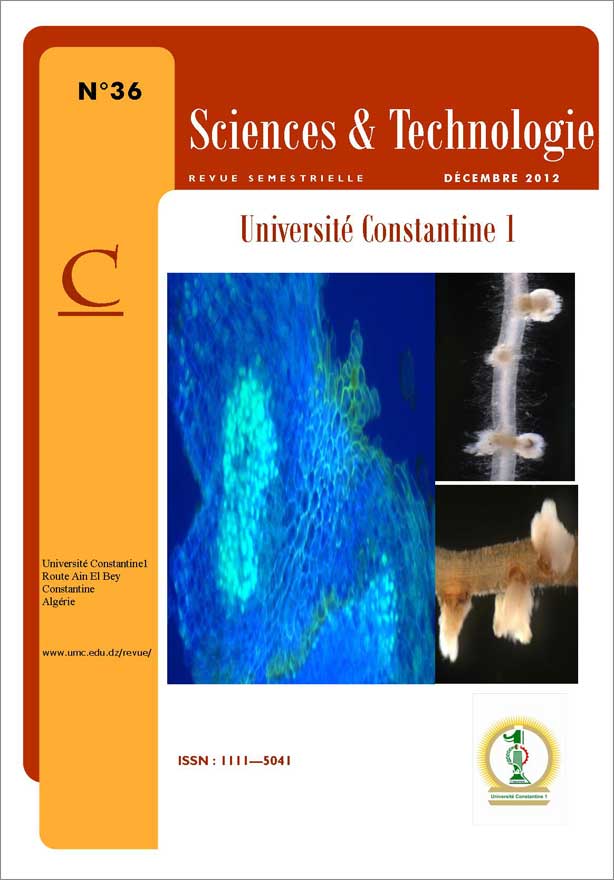FERMENTATION OF KIVUGUTO, A RWANDESE TRADITIONAL MILK: SELECTION OF MICROBES FOR A STARTER CULTURE
Mots-clés :
kivuguto, sequencing, Lactococcus, LeuconostocRésumé
A total of 390 bacterial strains were isolated from four kivuguto samples. Isolates were screened by phenotypic methods and molecular techniques using the PCR and sequencing of 16S rDNA and/or 16S-23S rDNA intergenic transcribed spacer (ITS) region. The rate of milk acidification and ability to grow under extreme environmental conditions were also examined for pre-selected isolates. Fermentation assays with mixed strains were performed to identify microbial formulations that produced milk similar to kivuguto. Such formulated milk was stored at 4°C on 24 days for shelf-life analysis to detect any organoleptic defect. Bacteria identified in kivuguto included Lactococcus lactis (strains CWB-B1466 and CWBI-B1469) and Leuconostoc mesenteroides subsp. mesenteroides (strains CWBI-B1467 and CWBI-B1465) and Leuconostoc pseudomesenteroides (T) (NRIC177) (strains CWBI-B1468, CWBI-B1470 and CWBI-B1471). One Leuconostoc sp. grew at low pH 2.5, in high sodium chloride concentration (up to 6.5%) and was resistant to heat (55°C). Fermentation experiments showed that kivuguto coagulates in 8 hours at 30°C. Three milk formulations produced using mixed strains gave good results. The best-tasting and longest shelf-life (35 days) kivuguto was produced by a mixture of two Leuconostoc spp. and Lactococcus lactis. These strains give kivuguto its characteristic properties.Références
- Jokovic, N. A survey of the lactic acid bacteria isolated from Serbian artisanal dairy product. International Journal of Food Microbiology. 127. 3. (2008). 305-311.
- Chuayana Jr, EL., Ponce., CV., Rivera, RB. and Cabrera, EC. Antimicrobial activity of probiotics from milk products. Philippine Journal of Microbiology and Infectious Diseases. 32. 2. (2003). 71-74.
- Feresu, SB. and Muzondo, MI. Identification of some lactic acid bacteria from two Zimbabwean fermented milk products. World Journal of Microbiology and Biotechnology. 62. (1990). 178-186.
- Chammas, GI., Saliba, R., Corieu, G. and Béal, C. Characterization of lactic acid bacteria isolated from fermented milk "laban". Int. J.of Food Microbiology. 110. (2006). 52-61.
- Tornadijo, EM., Fresno, JM., Sarmiento, RM. and Carballo, J. Study of the yeasts during the ripening process of Armada cheeses from raw goat's milk. Le Lait. 78. (1998). 647-659.
- FIL Lait et produits laitiers: Préparation des échantillons et des dilutions en vue de l’examen microbiologique. Norme FIL 122C. (1996). Fédération Internationale de Laiterie.
-FIL Levains lactiques de cultures de bactéries lactiques. Norme de composition. Norme FIL 149A. (1997). Fédération Internationale de Laiterie.
- Terzaghi, B. and Sandine, WE. Improved medium for lactic streptococci and their bacteriophages Journal of Applied Microbiology. 29. (1975). 807-813.
- Mayeux, JV., Sandine, WE. and Elliker, PR. A selective medium for detecting Leuconostoc in mixed-strain starter cultures. Journal of Dairy Science. 45. (1962). 655-656.
- Rogosa, M., Mitchell, JA. and Wiseman, RF. A selective medium for the isolation of oral and fecal lactobacilli. Journal of Bacteriology. 62. (1951).132-133.
-De Man, JC., Rogosa, M. and Sharpe, ME. A medium for the cultivation of lactobacilli. Journal of applied Bacteriology. 23. (1960). 130-135.
- Drancourt, M., Bollet, C., Carlioz, A., Martelin, R., Gayral, J-P. and Raoult, D. 16S
ribosomal DNA sequence analysis of a large collection of environmental and clinical unidentifiable bacterial isolates. Journal of Clinical Microbiology. 38. 10. (2000). 3623-3630.
-Applied Biosystems ABI PRISM SNaPshot Multiplex Kit, Foster City, California, USA. (2002).p50
- Ventura, M., Elli, M., Reniero, R. and Zink, R. (Molecular microbial analysis of Bifidobacterium isolates from different environments by the species-specific amplified ribosomal DNA restriction analysis (ARDRA). FEMS Microbiology Ecology. 36. (2001). 113-121.
- Mathara, MJ., Schillinger, U., Kutima, MP., Mbugua, SK. and Holzapfel, WH. Isolation, identification and characterization of the dominant microorganisms of kule naoto: the Maasai traditional fermented milk in Kenya. International Journal of Food Microbiology. 94. (2004). 269-278.
-Abdelgadir, WS., Hamad, SH., Moller, PL. and Jakobsen, M. Characterization of the dominant microbiota of sudanese fermented milk rob. International Dairy Journal. 1. (2001). 163-70.
- Narvhus, JA., Osteraas, K., Mutukumira, T. and Abrahamsen, RK. Production of fermented milk using a malty compound strain of Lactococcus lactis subsp. lactis biovar. diacetylactis. International Journal of Food Microbiology. 41. (1998). 73-80.
- Hadadji, M. and Bensoltane, A. Growth and lactic acid production by Bifidobacterium longum and Lactobacillus acidophilus in goat’s milk. African Journal of Biotechnology. 5. 6. (2006). 505-509.
- Mullan, WMA. Microbiology of starter cultures. Available from: http://www. dairyscience.info/cheese-starters/49-cheeese-starters.html. Accessed: March 16, 2011.
- Gasser, F., Montel, M-C., Talon, R. and Champomier, M. in Bactéries lactiques. Aspects fondamentaux et technologiques vol.1 : Application de la taxonomie moléculaire à la classification des bactéries lactiques (Lorica, éd.), Uriage, France. (1994). pp. 117-139.
- Millière, JB., Mathot, AG., Schmitt, P. and Divies, C. Phenotypic characterization of Leuconostoc species. Journal of Applied Bacteriology. 67. (1989). 529-542.
- Shaw, BG. and Harding, CD. Leuconostoc gelidum sp. nov. From chilled stored meats. International Journal of Food Microbiology. 36. (1989). 1-29.
- McDonald, LC., Fleming, HP. and Hassan, HM. Acid Tolerance of Leuconostoc mesenteroides and Lactobacillus plantarum. Applied and Environmental Microbiology. 56. 7. (1990). 2120-2124
- Ibourahema, C., Dubois Dauphin, R., Destain J. and Thonart, P. Characterization of lactic acid bacteria isolated from poultry farms in Senegal. African Journal of Biotechnology. 7. 12. (2008). 2006-2012.
- Franciosi, E., Settani, L., Cavazza, A. and Poznanski, E. Biodiversity and technological potential of wild lactic acid bacteria from raw cow’s milk. International Dairy journal. 19. (2009). 3-11.
-Kholif, AM., Mahran, GA., El-Nawavy, MA., Ismail, AA., Salem MME. and Zaky, WM. Use of some Lactobacillus strains to improve cheese quality. World Applied Sciences Journal. 11. 7. (2010). 766-774.
- Server-Busson, C., Foucaud, C. and Leveau, J-Y. Selection of Dairy Leuconostoc isolates for Important Technological Properties. Journal of Dairy Research. 66. (1999). 245-256.
- Hemme, D. and Foucaud-Scheunemann, C. Leuconostoc, characteristics, use in dairy technology and prospects in functional foods. International Dairy journal. 14. (2004). 467-494.

